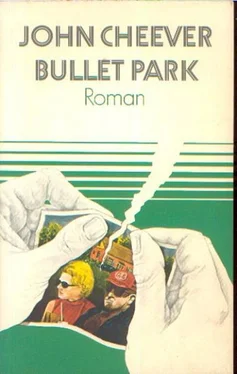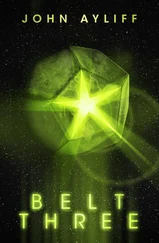John Cheever - Bullet Park
Здесь есть возможность читать онлайн «John Cheever - Bullet Park» весь текст электронной книги совершенно бесплатно (целиком полную версию без сокращений). В некоторых случаях можно слушать аудио, скачать через торрент в формате fb2 и присутствует краткое содержание. Жанр: Современная проза, на английском языке. Описание произведения, (предисловие) а так же отзывы посетителей доступны на портале библиотеки ЛибКат.
- Название:Bullet Park
- Автор:
- Жанр:
- Год:неизвестен
- ISBN:нет данных
- Рейтинг книги:3 / 5. Голосов: 1
-
Избранное:Добавить в избранное
- Отзывы:
-
Ваша оценка:
- 60
- 1
- 2
- 3
- 4
- 5
Bullet Park: краткое содержание, описание и аннотация
Предлагаем к чтению аннотацию, описание, краткое содержание или предисловие (зависит от того, что написал сам автор книги «Bullet Park»). Если вы не нашли необходимую информацию о книге — напишите в комментариях, мы постараемся отыскать её.
Bullet Park — читать онлайн бесплатно полную книгу (весь текст) целиком
Ниже представлен текст книги, разбитый по страницам. Система сохранения места последней прочитанной страницы, позволяет с удобством читать онлайн бесплатно книгу «Bullet Park», без необходимости каждый раз заново искать на чём Вы остановились. Поставьте закладку, и сможете в любой момент перейти на страницу, на которой закончили чтение.
Интервал:
Закладка:
I once had a girl who kept saying that she knew what my mother must be like. I don't know why an affair that centered on carnal roughhouse should have summoned memories of my old mother, but it did. The girl had it all wrong, although I never bothered to correct her. "Oh, I can imagine your mother," the girl would sigh. "I can see her in her garden, cutting roses. I know she wears chiffon and big hats." If my mother was in the garden at all she was very likely on her hands and knees, flinging up weeds as a dog flings up dirt. She was not the frail and graceful creature that my friend imagined. Since I have no legitimate father I may have expected more from her than she could give me but I always found her disappointing and sometimes disconcerting. She now lives in Kitzbühel until the middle of December-whenever the snow begins to fall-and then moves to a pension in the Estoril. She returns to Kitzbühel when the snow melts. These moves are determined more by economic reasons than by any fondness she has for the sun. She still writes to me at least twice a month. I can't throw the letters away unopened because they might contain some important news. I enclose the letter I most recently received to give you some idea of what her correspondence is like.
"I dreamed an entire movie last night," she wrote, "not a scenario but a movie in full color about a Japanese painter named Chardin. And then I dreamed I went back to the garden of the old house in Indiana and found everything the way I'd left it. Even the flowers I'd cut so many years ago were on the back porch, quite fresh. There it was, not as I might remember it, for my memory is failing these days and I couldn't recall anything in such detail, but as a gift to me from some part of my spirit more profound than my memory. And after that I dreamed that I took a train. Out of the window I could see blue water and blue sky. I wasn't quite sure of where I was going but looking through my handbag I found an invitation to spend a weekend with Robert Frost. Of course he's dead and buried and I don't suppose we would have gotten along for more than five minutes but it seemed like some dispensation or bounty of my imagination to have invented such a visit.
"My memory is failing in some quarters but in others it seems quite tenacious and even tiresome. It seems to perform music continuously. I seem to hear music all the time. There is music running through my mind when I wake and it plays all day long. What mystifies me is the variety in quality. Sometimes I wake to the slow movement of the first Razumovsky. You know how I love that. I may have a Vivaldi concerto for breakfast and some Mozart a little later. But sometimes I wake to a frightful Sousa march followed by a chewing gum commercial and a theme from Chopin. I loathe Chopin. Why should my memory torment me by playing music that I loathe? At times my memory seems to reward me; at times it seems vindictive and, while I'm speaking of memory, I must mention little Jamsie. [Jamsie is her Border terrier.] I was waked one night last week at about three by a curious sound. As you know Jamsie sleeps beside my bed and Jamsie was making the noise. She was counting. I distinctly heard her counting. She counted from one to twelve. After this she did the alphabet. She had trouble with her s's of course but I clearly heard her go through the alphabet. I know you'll think I'm mad but if porpoises can talk why not Jamsie? When she finished the alphabet I woke her. She seemed a little embarrassed at having been caught at her lessons but then she smiled at me and we both went back to sleep.
"I suppose you think all of this foolish but at least I don't go in for Tarot cards or astrology and I do not, as my friend Elizabeth Howland does, feel that my windshield wiper gives me sage and coherent advice on my stock market investments. She claimed only last month that her windshield wiper urged her to invest in Merck Chemicals which she did, making a profit of several thousand. I suppose she lies about her losses as gamblers always do. As I say, windshield wipers don't speak to me but I do hear music in the. most unlikely places-especially in the motors of airplanes. Accustomed as I am to the faint drone of transoceanic jets it has made me keenly aware of the complicated music played by the old DC-7s and Constellations that I take to Portugal and Geneva. Once these planes are airborne the harmonics of their engines sound to my ears like some universal music as random and free of reference and time as the makings of a dream. It is far from jubilant music but one would be making a mistake to call it sad. The sounds of a Constellation seem to me more contrapuntal-and in a way less universal than a DC-7. I can trace, as clearly as anything I ever heard in a concert hall, the shift from a major to a diminished seventh, the ascent to an eighth, the reduction to a minor and the resolution of the chord. The sounds have the driving and processional sense of baroque music but they will never, I know from experience, reach a climax and a resolution. The church I attended as a girl in Indiana employed an organist who had never completed his musical education because of financial difficulties or a wayward inability to persevere. He played the organ with some natural brilliance and dexterity but since his musical education had never reached the end of things, what had started out as a forthright and vigorous fugue would collapse into formlessness and vulgarity. The Constellations seem to suffer from the same musical irresolution, the same wayward inability to persevere. The first, second and third voices of the fugue are sounded clearly but then, as with the organist, the force of invention collapses into a series of harmonic meanderings. The engines of a DC-7 seem both more comprehensive and more limited. One night on a flight to Frankfurt I distinctly heard the props get halfway through Gounod's vulgar variations of Bach. I have also heard Handel's Water Music, the death theme from Tosca, the opening of the Messiah, etc. But boarding a DC-7 one night in Innsbruck-the intense cold may have made the difference-I distinctly heard the engines produce some exalting synthesis of all life's sounds-boats and train whistles and the creaking of iron gates and bedsprings and drums and rainwinds and thunder and footsteps and the sounds of singing all seemed woven into a rope or cord of air that ended when the stewardess asked us to observe the No Smoking sign (Nicht Rauchen), an announcement that has come to mean to me that if I am not at home I am at least at my destination.
"Of course I know that you think all of this unimportant. It is no secret to me that you would have preferred a more conventional mother- someone who sent you baked goods and remembered your birthday-but it seems to me that in our knowledge and study of one another we are circumspect and timid to an impractical degree. In our struggle to glimpse the soul of a man-and have we ever desired anything more-we claim to have the honesty of desperation whereas in fact we set up whole artificial structures of acceptable reality and stubbornly refuse to admit the terms by which we live. I will, before I end my letter, bore you with one more observation of fact. What I have to say must be well known to most travelers and yet I would not dare confide my knowledge to an intimate friend, lest I be thought mad. Since you already think me mad I suppose no harm can be done.
"I have noticed, in my travels, that the strange beds I occupy in hotels and pensions have a considerable variance in atmosphere and a profound influence on my dreams. It is a simple fact that we impress something of ourselves-our spirits and our desires-on the mattresses where we lie and I have more than ample evidence to prove my point. One night in Naples last winter I dreamed of washing a drip-dry wardrobe which is, as you well know, something I would never do. The dream was quite explicit-I could see the articles of clothing hanging in the shower and smell the wet cloth although this is no part of ray memories. When I woke I seemed surrounded by an atmosphere unlike my own-shy, earnest and chaste. There was definitely some presence in the room. In the morning I asked the desk clerk who had last occupied my bed. He checked his records and said that it had last been occupied by an American tourist-a Miss Harriet Lowell-who had moved to a smaller room but who could then be seen coming out of the dining room. I then turned to see Miss Lowell, whose white drip-dry dress I had already seen in my dreams and whose shy, chaste and earnest spirit still lingered in the room she had left. You will put this down to coincidence, I know, but let me go on. Sometime later, in Geneva, I found myself in a bed that seemed to exhale so unsavory and venereal an atmosphere that my dreams were quite disgusting. In them I saw two naked men, mounted like a horse and rider. In the morning I asked the desk clerk who the earlier tenants had been and he said: "Oui, oui, deux tapettes." They had made so much noise they had been asked to leave. After this I made a practice of deciding who the previous occupant of my bed had been and then checking with the clerk in the morning. In every case I was correct-in every case, that is, where the clerk was willing to cooperate. In cases involving prostitutes they were sometimes unwilling to help. If I found no presence in my bed I would judge that the bed had been vacant for a week or ten days. I was always correct. Traveling that year I shared the dreams of businessmen, tourists, married couples, chaste and orderly people as well as whores. My most remarkable experience came in Munich in the spring.
Читать дальшеИнтервал:
Закладка:
Похожие книги на «Bullet Park»
Представляем Вашему вниманию похожие книги на «Bullet Park» списком для выбора. Мы отобрали схожую по названию и смыслу литературу в надежде предоставить читателям больше вариантов отыскать новые, интересные, ещё непрочитанные произведения.
Обсуждение, отзывы о книге «Bullet Park» и просто собственные мнения читателей. Оставьте ваши комментарии, напишите, что Вы думаете о произведении, его смысле или главных героях. Укажите что конкретно понравилось, а что нет, и почему Вы так считаете.












